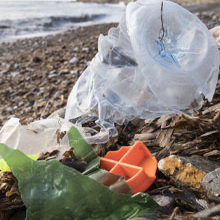Using microbiology to bring single use plastics into a circular economy
30 November 2018

Useful products could be generated from biodegrading plastics, researchers say. In a review published in the journal Microbiology, Tanja Narancic and Kevin O’Connor discuss the advances made in biodegradation of fossil-based plastics, the design of plastics for biodegradation and how microbes can transform plastic waste into useful products.
The Dublin-based researchers report on the use of microbes and their enzymes to degrade plastics such as polyethylene (PE) and polyethylene terephthalate (PET), which are commonly used to produce plastic bags and bottles.
The researchers also discuss various studies investigating biodegradable plastics and their design. This includes their previous research, carried out at the BEACON Science Foundation Ireland (SFI) Bioeconomy Research Centre and University College Dublin, that was published in Environmental Science & Technology, whereby a biodegradable plastic suitable for home composting was developed. This new plastic was made by blending two plastics often used in plastic packaging; polycaprolactone (PCL), a fossil-based plastic, and polylactic acid (PLA), a bioplastic produced by the fermentation of sugars.
If managed correctly, biodegradable plastics are degraded into non-toxic end products (water and carbon dioxide), meaning no release of microplastics — which are of growing concern due to their unknown impact on marine life and terrestrial ecosystems — and toxic by-products into the environment. Biodegradable plastics can even be converted into useful end products such as fertiliser, biogas and chemical products by an industrial process called anaerobic digestion.
During anaerobic digestion, microbes produce enzymes which break down plastic in an enclosed, airtight system. During this process a methane-rich biogas is produced, which could be used to make green electricity or used as a transport fuel. A nutrient-rich ‘digestate’ remains at the end and can be collected and used as a fertiliser.
A number of conditions influence the ability of microbes to degrade plastics, including temperature, moisture and the properties of the plastic. Often, the temperatures required to biodegrade plastic are higher than those that occur naturally in the environment. Some biodegradable polymers can degrade in a home compost while others require higher temperatures, only seen in a commercial facility, to allow biodegradation. Commercial composting facilities are places where garden and food waste are currently managed.
This review is important, the researchers say, as it contributes to the idea of moving plastics towards a circular economy model, where plastic waste is managed, and retained and repurposed where possible; thus reducing waste. Where biodegradation is possible, the carbon that makes up plastic is returned to the environment safely and sustainably.
Professor Kevin O’Connor, who has been researching the reuse of plastic waste since 1999, said, "Biodegradable plastics are seen as a solution for biodegradation in nature but in fact they are much better managed as part of a circular waste management system... Microbes and their enzymes are central to research developments for the management of waste biodegradable and non-biodegradable waste plastics in the next decade."
The management of plastics would also reduce the accumulation of plastics in the ocean. In Europe, 50% of marine litter is from single use plastics.
Narancic, T & O’Connor, K. E. (2018). Plastic waste as a global challenge: Are biodegradable plastics the answer to the plastic waste problem? Microbiology DOI:10.1099/mic.0.000749
Notes to Editors:
The full scientific paper can be found on the Microbiology website here. (DOI: 10.1099/mic.0.000749)
Microbiology, published monthly since 1947, is a publication of the Microbiology Society. The Microbiology Society is a membership charity for scientists interested in microbes, their effects and their practical uses. It is one of the largest microbiology societies in Europe with a worldwide membership based in universities, industry, hospitals, research institutes and schools.
In the five years between 2018 and 2022, the Microbiology Society’s principle goal is to develop, expand and strengthen the networks available to our members so that they can generate new knowledge about microbes and ensure that it is shared with other communities. The impacts from this will drive us towards a world in which the science of microbiology provides maximum benefit to society. Find out more at microbiologysociety.org
To celebrate our 75th anniversary in 2020, we are launching a wide-ranging programme of events and activities to showcase why microbiology matters and demonstrate the impact of microbiologists past, present and future in addressing global challenges.
Anniversary events and activities include Why Microbiology Matters, a call to the community to nominate a discovery, event or activity that best highlights how microbiology answers big questions by giving us knowledge of very small things, a project on microbiology and the UN Sustainable Development Goals and a showcase of our Fleming Prize winners. #MicrobioSoc75th
For more information, please contact: [email protected]
Image: Marco_Bonfanti/Thinkstock.
